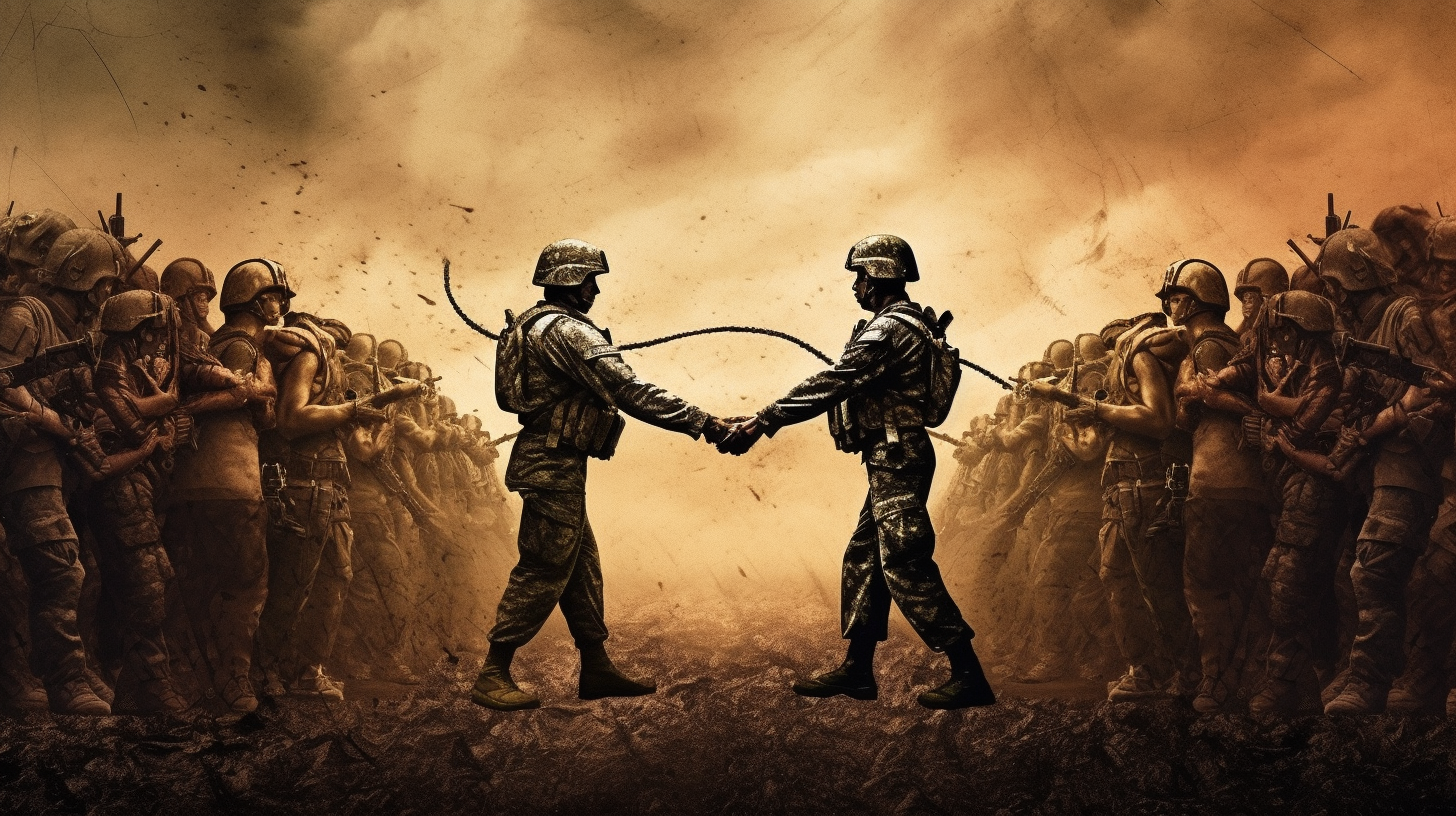The Ethics of War: Just War Theory and the Morality of Armed Conflicts
In warfare, where death and destruction reign supreme, the "just war" concept attempts to provide a moral framework for engaging in armed conflicts. The so-called Just War Theory, with its veneer of moral rectitude, has long been a subject of debate among scholars and intellectuals. However, as we delve into the depths of this ethical dilemma, we must confront the uncomfortable reality that the concept of a just war is but an illusion. This convenient intellectual construct does little to alleviate the horrors of armed conflicts. In this critical examination, we shall expose the fallacies inherent in Just War Theory, challenge its conventional wisdom, and call into question its supposed moral foundations.

I. The Fallacy of Moral Equivalence:
One of the critical underpinnings of the Just War Theory is the notion of moral equivalence between belligerents. It posits that both sides have a just cause, and the conflict becomes morally permissible based on the principles of proportionality and discrimination. However, this presupposes that the goals and actions of the conflicting parties are fundamentally equal in their moral standing. History, however, tells a different story.
Consider, for instance, World War II. Was there any moral equivalency between the Nazi regime and the Allied forces? Could the atrocities committed by the Nazis be weighed against the liberation efforts of the Allies? The answer is a resounding no. The Allies fought against an ideology rooted in hatred, racism, and genocide, while the Nazis waged war for domination and racial supremacy. To treat both sides as morally equivalent is to embrace moral relativism at its worst.
II. The Myth of Proportionality:
Just War Theory also purports to impose the principle of proportionality, which suggests that the harm caused by war must be proportional to the anticipated benefits. Yet, in practice, the calculation of proportionality is fraught with subjectivity and manipulation. Who determines what level of destruction is acceptable in pursuing a just cause? How do we weigh human lives against abstract concepts of justice?
Consider the infamous Hiroshima and Nagasaki bombings during World War II. Proponents of the Just War Theory argue that the bombings were justified due to the potential lives saved by hastening the war's end. However, this perspective conveniently ignores the immense suffering inflicted upon innocent civilians, the long-lasting physical and psychological scars, and the ethical precedent set by resorting to such extreme measures. Proportionality, in reality, becomes a tool for excusing acts of indiscriminate violence rather than a moral compass.

III. The Temptation of Self-Righteousness:
One of the dangers of Just War Theory is its potential to foster a sense of self-righteousness among belligerents. The belief in a just cause often leads to an unwavering certainty that one's side is on the side of righteousness, thus justifying any means necessary to achieve victory. Unfortunately, this mindset can have disastrous consequences, as it shuts down critical introspection and hinders the exploration of alternative solutions.
The Vietnam War serves as a cautionary tale in this regard. The United States believed it was fighting against the spread of communism, positioning itself as the guardian of democracy. However, the stark reality was far from the glorious narrative. The war resulted in the deaths of millions of Vietnamese civilians and the loss of countless American lives. By falling prey to the illusion of moral superiority, the United States failed to assess the legitimacy of its cause critically and instead perpetuated a morally bankrupt conflict.
IV. The Quandary of "Just" Means:
Just War Theory not only focuses on the justification for engaging in war but also attempts to outline ethical conduct during warfare. However, the fog of war often clouds the practical application of these principles. In the heat of battle, pursuing lofty moral ideals usually takes a backseat to survival and the instinct for self-preservation. Moreover, the chaos and brutality of armed conflicts make it nearly impossible to adhere to discrimination and proportionality principles strictly.
Consider the countless instances throughout history where atrocities were committed for a just cause. The My Lai Massacre during the Vietnam War, the indiscriminate bombings in the Middle East, and the use of torture during the "War on Terror" are all glaring examples of the moral compromises that occur in the heat of battle. Just War Theory's attempt to reconcile moral rectitude with the grim reality of warfare is a futile exercise that only serves to whitewash the inherent brutality of armed conflicts.

Conclusion:
Just War Theory, with its purported moral foundations, crumbles under the weight of scrutiny. The illusions it creates, the fallacies it perpetuates, and the self-righteousness it engenders all serve to obfuscate the true nature of warfare: a brutal and often senseless exercise in human suffering. Challenging the conventional wisdom of Just War Theory is to confront the uncomfortable truth that no war is indeed just, and pursuing moral purity within the context of warfare is a fool's errand.
To truly address the ethics of war, we must move beyond the imaginary confines of the Just War Theory. Instead, we must recognize the complexity and moral ambiguity inherent in armed conflicts and strive for alternative means of conflict resolution that prioritize diplomacy, human rights, and the preservation of life. Only by confronting the uncomfortable realities of war can we hope to build a more peaceful and just world.

Plato Re-Imagined
This course offers 32 comprehensive lectures exploring most of Plato's dialogues. These lectures guide students toward a consilient understanding of the divine—a concept that harmonizes knowledge across disciplines and resonates with secular and religious leaders. As a bonus, Lecture #33 focuses on consilience, demonstrating how different fields of knowledge can converge to form a unified understanding.






